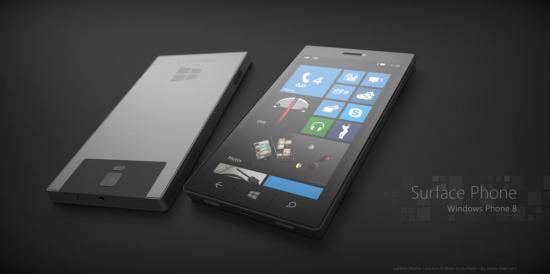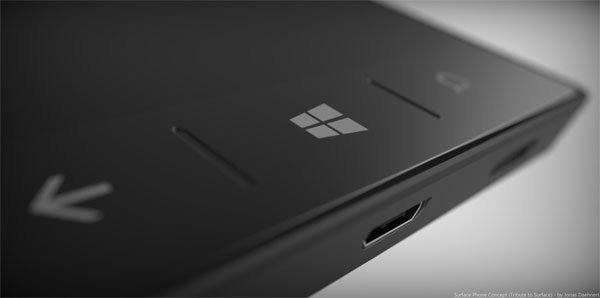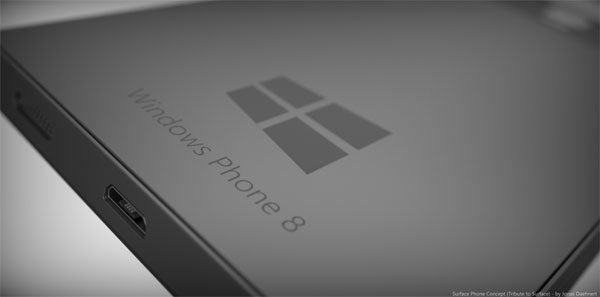Is Microsoft making its own Windows Phone in 2013? We discuss the options.

Concept Surface phone (Image via Jonas-Daehnert)

It has been a few months since we last heard anything about Microsoft making its own Windows Phone again, so it looks like we’re about due.
A new “report” from the not so trusty China Times straightforwardly states that Microsoft will have its own Windows Phone launch sometime in early 2013 and that they’ve been working on it with a hardware partner for the last four months.
Evidence? Sources? Who needs those things on the internet!
However, some of our readers have asked to weigh in on the matter so instead of just ignoring this story (what we would prefer to do) we’ll give our thoughts on it. Obviously, with our snarky “who needs sources” banter above, you can get a feel for what side we come down on this topic.
Stop the presses...or intertubes or whatever powers this thing
The preamble
First off, we would never 100% rule out Microsoft making their own phone. They’re a billion dollar company, they can and will do whatever they want, when they want and if they decided to make a smartphone, gosh darn it they could. Seriously, who's going to stop them? They make the Xbox 360, Kinect, Zune HD, mice, keyboards, HD Web cams and tablets. They could do a phone.
Get the Windows Central Newsletter
All the latest news, reviews, and guides for Windows and Xbox diehards.
But we just don’t see it happening. Not now at least.
For one, Microsoft has a lot invested with Nokia who as a co-partner has been driving Windows Phone development. We couldn’t think of a worse move for Redmond to make than throwing Nokia under the bus in such a way—talk about a vote of “no confidence”.
Second, Microsoft and HTC just announced “the Signature series” of Windows Phones with the 8X and 8S. In practical terms, Microsoft sees those devices as the base for all Windows Phone 8 devices—the “true” representation of the platform. (What that means for Nokia is a whole other discussion).
In other words, Windows Phone 8 already has its headlining hardware with those two companies (and to a lesser extent, Samsung). Those devices, at least on paper, are outstanding achievements in terms of design, originality and hardware features. How could Microsoft possibly improve upon HTCs new design and bold colors? How could Microsoft one up Nokia with that amazing PureView camera or PureMotion HD+?

Concept Surface phone by YrOnimuS
The Google Nexus angle
The first angle we can see for a Microsoft branded Windows Phone would to have a “Nexus like” experience. But that analogy doesn’t hold too well with Windows Phone.
Google’s Nexus line is the “pure OS” without any skins or modifications to it—just the straight up, latest build of Android.
Would Windows Phone need that? No one skins the OS and most of the differences, much to the consternation of some OEMs, are very superficial. So the comparison to a Nexus line just doesn’t add up. Unless…
…they want some low cost, direct to market phones that they can sell right to consumers with no carrier contracts-- devices that they can sell from WindowsPhone.com which represent the “true” experience but are not competing for carrier representation with their OEMs. This would allow Microsoft to fill in some of that market, offer directly updated phones with no carrier intervention and even eat some of the costs (much like what Google does to keep the price low).
While that sounds like a decent idea, there’s no evidence to support it just yet.

Concept Surface phone by YrOnimuS
Contingency Plan?

The second angle here for which we could see as a shred of hope for this Microsoft Windows Phone rumor is if this initial launch of Windows Phone 8 hardware fails to impress and catch on.
Let’s not mince words: if that happens, Windows Phone 8 (and especially Nokia) are in trouble.
That doesn’t mean the Lumia 920 or the 8X need to outsell the iPhone 5 or crush the latest Android phone in terms of market share, it just means there has to be some significant momentum built.
If not, investors will get very cautious of Nokia (even more so than they are now), you’ll see calls for Elop’s replacement and the future of that company could be at stake. Seeing as Nokia is the only OEM who is fully invested in Windows Phone, that’s a big risk if something goes wrong.
It’s only in that sense could we possibly think that Microsoft would consider making their own hardware—Nokia has gone bust and HTC is playing cozy with Android again. Then we may see Microsoft step in with the “let us show you how it’s done” bravado that stirred the creation of the Surface tablets. But even if that scenario were to happen, it would be a very different reason than why Microsoft is making the Surface.
In this case, Microsoft would be both trying to set the bar and trying to keep their brand afloat, whereas with Surface it’s about just getting their myriad of partners all on the same page in terms of design.
Betting against it

For now though, we find such situations unlikely. By all accounts, HTC and Nokia should have solid launches with their “hero” phones and Microsoft will not step in to jeopardize that by adding confusion with a self-branded device. We can’t think of a single pundit or investor who would read that as anything other than fear and uncertainty in their own partners.
Speaking of, if we wanted to be really cynical we could suggest that this story is purposefully creating fear, uncertainty and doubt (aka FUD) for the Windows Phone 8 pre-launch.
With Surface, Microsoft demonstrated (a) they can keep a hardware secret and (b) they aren’t afraid to do their own hardware if it suits them. For those reasons, we can’t dismiss the idea that they won’t ever take such a tract, but we’re just not seeing any evidence of it. The rest is, as they say, speculation.

Daniel Rubino is the Editor-in-chief of Windows Central. He is also the head reviewer, podcast co-host, and analyst. He has been covering Microsoft since 2007 when this site was called WMExperts (and later Windows Phone Central). His interests include Windows, laptops, next-gen computing, and wearable tech. He has reviewed laptops for over 10 years and is particularly fond of 2-in-1 convertibles, Arm64 processors, new form factors, and thin-and-light PCs. Before all this tech stuff, he worked on a Ph.D. in linguistics, performed polysomnographs in NYC, and was a motion-picture operator for 17 years.
